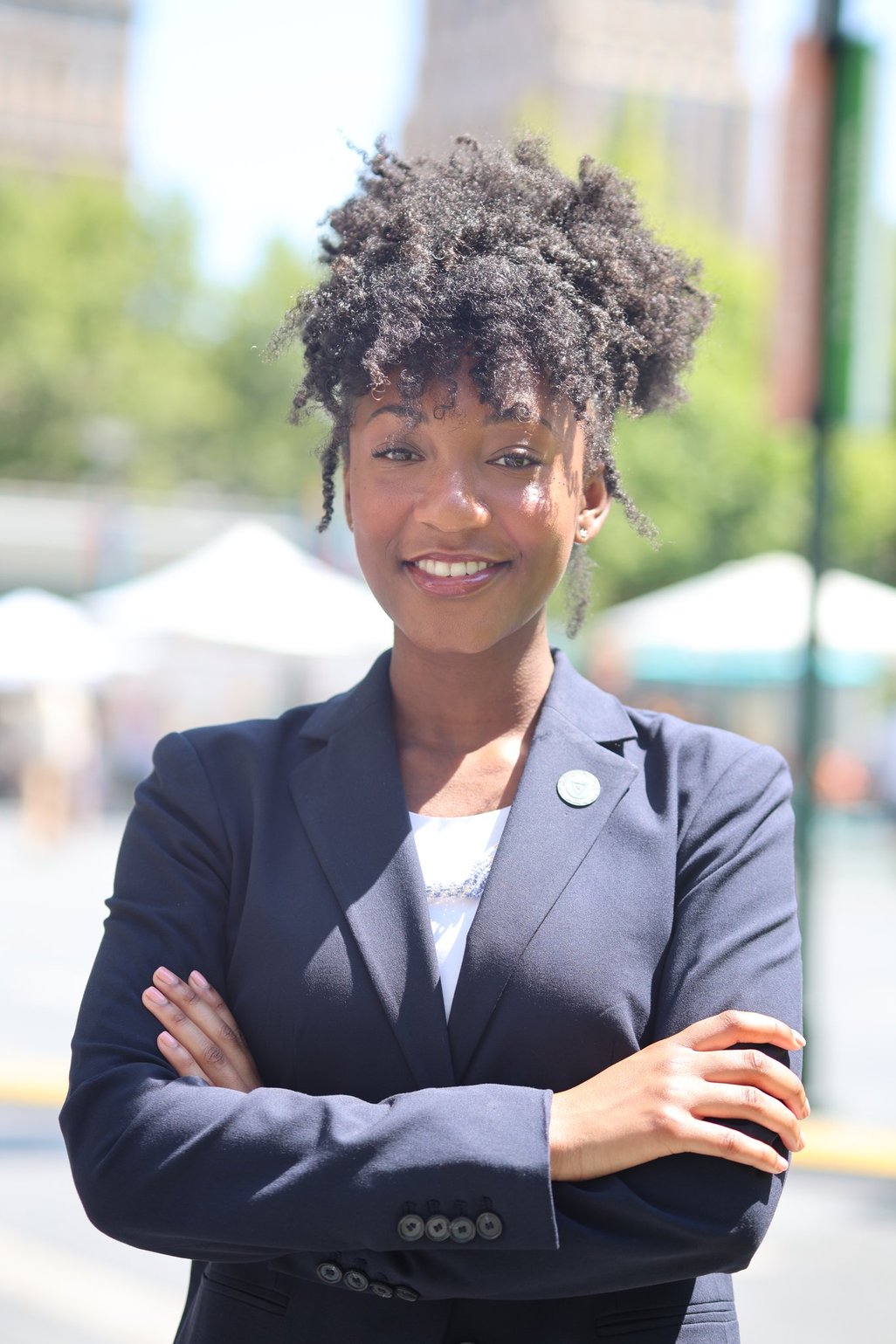03 February 2025 4 minute read
For the past 19 years, Laila R. Johnson (Class of 2027) has been a familiar presence in the pews, absorbing the steady rhythm of service while tucking various post-it notes into her Bible. For her, church has always meant witnessing firsthand the power of community and faith-driven service.“For me, growing up in church always meant witnessing and doing community service,” Johnson reflects. “It was never about checking a box—it was about living with purpose, being intentional about the way I show up for others.” This foundation of faith and service would shape her trajectory guiding her to the historic halls of Spelman College, where she’s now a sophomore majoring in Sociology & Anthropology with a deep commitment to education, civil rights law, and advocacy.
Johnson’s commitment to educational advocacy; however, didn't start in a classroom; it began thousands of miles away in Ghana where she studied abroad in high school. “Ghana changed me,” she says simply. “Not just in terms of my understanding of Blackness and history, but in seeing firsthand what education could look like when rooted in love and respect.” It was there that she stepped into a student-teacher role at Billa Mahmud Memorial Future Leaders School and witnessed how even when children inside the classrooms did not have pencils or other classroom resources, they shared without hesitation. More than that, the 19-year-old third grade teacher commanded so much respect in the classroom, not through the promise of punishment, but upliftment. Her experience in Ghana reshaped the way she viewed American education.
Returning home to Philadelphia, she became focused on the stark disparities between urban and suburban school districts, in regards to funding and overall student outcomes. However, she realized that the issue extended far beyond money—“It wasn’t just about resources—it was about the classroom culture,” Johnson explains. “And when I came back to Philly, researching the disparities in funding and opportunity between my Philadelphia public school district and neighboring suburban schools was striking.The question became: “How can I bring that Ghanaian culture of love and respect into local educational policies?” That question became her mission.

Johnson’s start in Black educational activism was far from happenstance, it was always brewing beneath the surface. In high school, she served as President of the African American Student Union. “I didn’t see it as a career path at first—just something I cared deeply about,” she admits. “But by senior year, I realized I was more invested in spending time researching education policy and racial disparities than I was on some of my own school work. That’s when it clicked.”
At Spelman, that passion was fostered. Though she’s majoring in Sociology & Anthropology, she recently declared an Education Studies minor to deepen her understanding of policy and pedagogy. “Whatever I do, and wherever I go, I want to ensure that I cultivate spaces where Black people can be their full authentic selves,” she says. “Especially now, with anti-CRT and anti-woke legislation on the rise, we have to fight for an education that acknowledges and values our lived experiences.”
For Johnson, advocacy extends beyond policy—it’s also about how we tell our stories and the voices that shape them. That is where speech and debate comes in. Growing up in church, she was exposed to public speaking at a young age, which gave the outlet to hone her ability to command a room. By middle school, she was competing in oratorical speech contests and by high school, she joined the debate team. However, after encountering a predominantly white debate culture, she walked away. “I was done,” she admits. “I didn’t want to be in spaces where my experiences weren’t valued.”
Everything changed when she arrived at Spelman. Her mother encouraged her to check out the debate team, and she reluctantly gave it a shot. Not only did she make the team, but since that moment, she’s thrived in it. “What I love about the Spelman College Speech and Debate team at Spelman is that it prioritizes Black womanhood and recognizes Black intellectuality as academic,” she explains. “We don’t just pull from JSTOR articles or .edu websites—we recognize that our own lived experiences are valid forms of evidence.”
Her leadership quickly stood out, earning her a role as the new Debate Captain for the 2024-2025 school year. Ahead of this year, Johnson had three main goals for her team:
Under her leadership, Spelman’s Debate team competed at Vanderbilt University Global Free Speech Summit where they tackled the challenge of political disinformation in the age of artificial intelligence and deep fakes. They didn’t just show up—they dominated, winning first place. Additionally, she directed their Fall 2024 Showcase, entitled “Sankofa” where the team honored the 100-year legacy of their team and radical alumnae.
Yet for Johnson, Spelman is not just an academic institution—it’s a spiritual one. Sundays at Sisters Chapel have become her refuge, a space where she can breathe, reset, and realign with her purpose. Whether through the welcoming melodies of the Sisters Chapel anthem, Dean Guidry’s powerful sermons, or her fellow Chapel Assistants, Sisters Chapel has been a grounding force in her experience.
As a Spelmanite, Johnson is not bound to conform to predefined notions of a Spelman woman—she’s interested in redefining what that means. Invoking the words of Maya Angelou, she echoes that “people will never forget how you make them feel” and Johnson hopes to leave a legacy of kindness and authenticity. Whether in classrooms, courtrooms, or on debate stages, Johnson's mission remains the same—to create spaces where Black students aren’t just seen, but heard, empowered, and respected.
